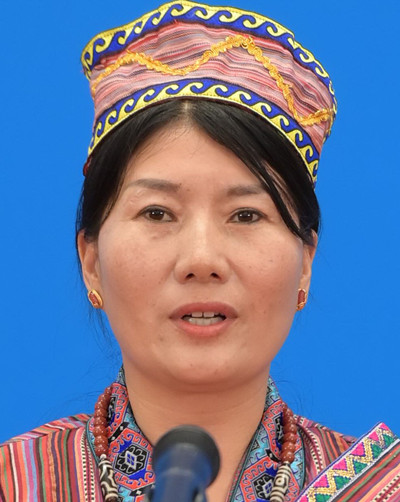Monba deputy pays back hometown with teaching

Kelsang Dekyi
Ethnic-Monba teacher Kelsang Dekyi understands deeply the importance of education, and she chooses to work in a remote place as an opportunity to devote her efforts to help her people in the Tibet autonomous region.
"I grew up in a remote area but I managed to change my life with knowledge, and I believe that education has the magic effect of changing others as well," said Kelsang Dekyi, vice-principal of the Wanquan Primary School in Tibet's Metog county, the last county in China to have access to highways.
Kelsang Dekyi, 43, has served as a deputy to the National People's Congress since 2018 thanks to her special dedication to grassroots education in her hometown, where she has taught for 20 years since graduating from college.
As a member of the Monba ethnic group, one of the ethnic groups with the smallest population in China, Kelsang Dekyi experienced difficulties seeking education as a teenager in her home village in Metog.
She went to a primary school in another county to receive a better education, but it would take her days of walking to reach it.
"It took my father and me six days to walk from my village to the primary school, so we camped in crude shacks at night and it was very exhausting," she said.
Then the school was burned down by some students playing with fire, so she was forced to find another one in Nyingchi, more than 300 km from her village. She lived in a dormitory for four years and went back home only once.
"It was so far and the journey was full of dangers, such as heavy snowfall, landslides and mudslides," she said.
"Because people were poor and school was so far away, most of my fellow villagers did not think about going to school at that time," she said.
After graduating from primary school, she received her secondary school education in Henan province, and graduated in 2001 from Hebei Normal University's Minzu College, which mainly receives Tibetan students.
After graduation, Kelsang Dekyi returned to offer her fellow villagers better educational opportunities.
"My hometown is beautiful, but isolated, without good education, so the villagers would never have the chance to explore the outside world," she said.
She taught for 16 years in a primary school in her village before teaching in the county's primary school. She has encouraged countless parents to send their children to school.
"I found that many kids dropped out of school. I did more work trying to bring them back than teaching," she said, adding that she visited about 1,000 people in six villages.
One girl was forced to drop out of primary school before graduating because of her family's poverty. Kelsang Dekyi managed to convince the parents to allow the girl to return after explaining the policies to support the studies and introducing her own life-changing experience that relied on education.
"Later, that student ultimately continued her studies through to college, and she now works as a teacher in her hometown like I do," she said.
Kelsang Dekyi said thanks to the efforts of government and local teachers, the rates of primary and junior middle school enrollment now reaches 100 percent, and many of her fellow villagers work for government institutes or companies.
"In the past, our mission was to persuade parents to send their children to school and keep them in school. Now our task is to provide them with better education," she said.
Kelsang Dekyi said teaching quality has been improving steadily in her school and that more local residents understand the importance of education. Many people, she said, have found jobs thanks to education and people's livelihoods have improved dramatically.
"When I was in primary school, we were basically taught only Tibetan, Chinese and mathematics. Now the schoolchildren receive multiple choices of courses, and we have a laboratory, art room and music studio," she said.
"Students whose parents are farmers and herdsmen can receive 15 years of free education, from kindergarten to high school," Kelsang Dekyi said.
"I myself am a beneficiary of education, and I believe education can change people's lives. For the rest of my work career, I want to continue to work hard for the better futures of the next generations."



